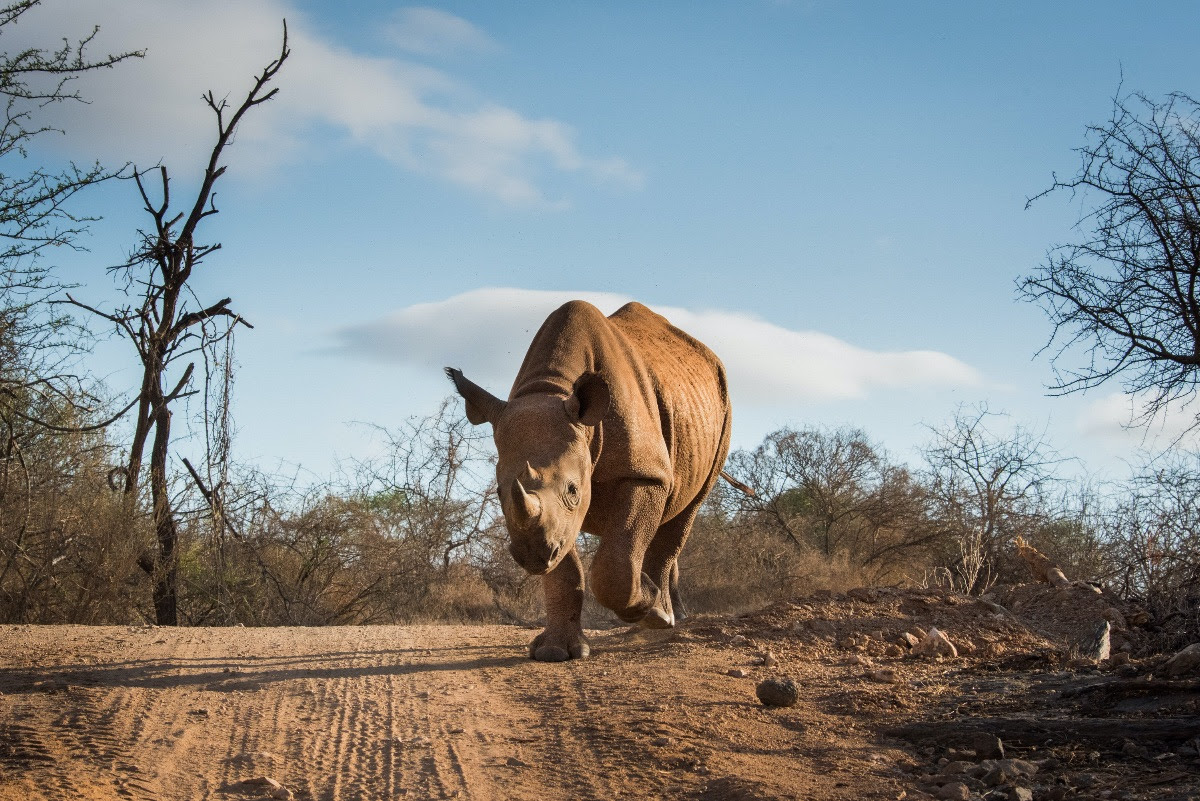Ask anyone at our Kaluku Field HQ about baby Apollo, and their response will probably be the same: He’s not such a baby anymore! In fact, when you see him barreling around the compound, he has all the brawn and burliness we associate with adult rhinos. While Apollo has many years until he reaches maturity, one glance at him and you can see a projection of the formidable rhino he will be when fully grown.
 At just 20 months old, however, Apollo is still very young. Lest we forget this fact, he offers up constant reminders: rushing back to his Keepers if a mysterious noise startles him, snuggling under his little tent each night, or squeaking loudly for his milk feeds. Indeed, the Keepers start their day accompanied by a symphony of squeaks coming from Apollo’s stable. Once he wakes up and hears the team preparing morning milk bottles for the orphans, he can’t resist chiming in to make sure he isn’t forgotten — not that he ever has been!
At just 20 months old, however, Apollo is still very young. Lest we forget this fact, he offers up constant reminders: rushing back to his Keepers if a mysterious noise startles him, snuggling under his little tent each night, or squeaking loudly for his milk feeds. Indeed, the Keepers start their day accompanied by a symphony of squeaks coming from Apollo’s stable. Once he wakes up and hears the team preparing morning milk bottles for the orphans, he can’t resist chiming in to make sure he isn’t forgotten — not that he ever has been!
 After slurping down his bottles, Apollo heads out into the bush surrounding our Kaluku compound. Some days, his Keepers choose the route; others, he leads the way. He has developed a fun morning ritual, swinging through our Field Operation Manager’s lawn, where the orphaned antelope like to graze. Fuelled by his milk and energised by the crisp morning air, Apollo is usually feeling particularly feisty at this point. He burns off steam by running around the lawn as fast as his legs will carry him, engaging the kudus, oryx or eland in a chasing game, if they are up for it.
After slurping down his bottles, Apollo heads out into the bush surrounding our Kaluku compound. Some days, his Keepers choose the route; others, he leads the way. He has developed a fun morning ritual, swinging through our Field Operation Manager’s lawn, where the orphaned antelope like to graze. Fuelled by his milk and energised by the crisp morning air, Apollo is usually feeling particularly feisty at this point. He burns off steam by running around the lawn as fast as his legs will carry him, engaging the kudus, oryx or eland in a chasing game, if they are up for it.
Apollo loves his games of chase with the antelopes
Whether his explorations take him down the sandy lugga or through the bush, Apollo always ends up at the same place around 11 o’clock: the mud bath. This is where he finds his bliss, striking all sorts of poses until he is fully slathered in mud. Knowing that he is quite tuckered out by this time, the Keepers often encourage Apollo to take a nap. They murmur, “Lala Apollo, lala!” (“lala” is the Swahili word for sleep) and, as if he’s in a trance, the little rhino sinks to the ground and shuts his eyes. This is followed by a more extended snooze under the shade of the nearby baobab tree, while his Keepers enjoy their lunch.
 This same lullaby also helps Apollo settle down for the night, although he rarely needs much encouragement. At the end of another exciting day, he is usually tired out by the time he returns home. He finds a spotless stable awaiting him, full of freshly cut greens to munch on. After a warm bottle of milk, Apollo seeks out the mattress in the corner and, as he has done since day one, hoists it over himself like a little tent. This is our sign that Apollo is ready to “lala,” no doubt dreaming of the adventures that await him the next day.
This same lullaby also helps Apollo settle down for the night, although he rarely needs much encouragement. At the end of another exciting day, he is usually tired out by the time he returns home. He finds a spotless stable awaiting him, full of freshly cut greens to munch on. After a warm bottle of milk, Apollo seeks out the mattress in the corner and, as he has done since day one, hoists it over himself like a little tent. This is our sign that Apollo is ready to “lala,” no doubt dreaming of the adventures that await him the next day.
Apollo loves his games of chase with the antelopes




































